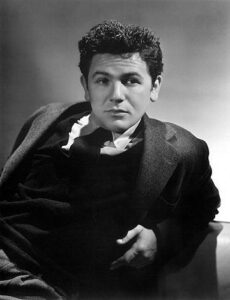
John Garfield (March 4, 1913–May 21, 1952) was born in New York City as Jacob Julius Garfinkle to Russian Jewish immigrants David Garfinkle, a clothes presser, and his wife Hannah, who died when John was seven years old. John was farmed out to relatives, often living in one tenement apartment and sleeping in another. On the streets, Garfield learned “all the meanness, all the toughness it’s possible for kids to acquire,” commenting later, “If I hadn’t become an actor, I might have become Public Enemy Number One.” After his father moved to the West Bronx, Garfield became the leader of a street gang. At P.S. 45, a school for difficult children, Garfield was introduced to acting and debate. He also was taught how to control his stammer.
He took lessons at a drama school, where he was mentored by Yiddish actor Jacob Ben-Ami who got him into the American Laboratory Theatre, where under the tutelage of Richard Boleslavski and Maria Ouspenskaya, he learned the Stanislavski Method of acting. At the “Lab,” he was influenced by Stella Adler and Lee Strasberg, among other theatre gurus. Garfield made his Broadway debut in 1932 in a short-run play called Lost Boy, which earned him a credit. His next gig was a three-month stint playing Henry the office boy in Counsellor-at-Law starring Paul Muni. A friend from the old neighborhood, Clifford Odets, then cast him as Ralph in Awake and Sing, which opened in 1935 with Garfield singled out by critic Brooks Atkinson for having a “splendid sense of character development.”
He subsequently received a seven-year contract from Warner Brothers, whose executive Jack Warner told the actor to change his name to John Garfield. The 1938 film Four Daughters won Garfield positive reviews and an Academy Ward nomination as Best Supporting Actor. During World War II, Garfield and actress Bette Davis created the Hollywood Canteen, a club providing food and entertainment for the troops. Garfield made trips overseas to entertain military service personnel. In Hollywood, he made such films as Air Force, Destination Tokyo, and Pride of the Marines. To prepare for the latter role, he lived for weeks with the real-life Al Schmid, who had been blinded in combat. Garfield would walk around blindfolded for hours at a time.
Following the war, Garfield starred with Lana Turner in The Postman Always Rings Twice; and with Joan Crawford in Humoresque. He took a supporting role in Gentlemen’s Agreement because he wanted to participate in that film’s exposé of antisemitism. He was nominated for an Academy Award in 1947 for his leading role in Body and Soul. In 1951 like many other actors, he was called before the House Committee on Un-American Activities in its investigation of Communist influences in the movie industry. After refusing to name Communist party members or followers in Hollywood, Garfield was black-listed and never made another film He continued to work on stage, and starred in a 1952 revival of Golden Boy. He died later that year of a heart attack, leaving his estate to his wife Roberta Seidman, whom he had married in 1935 and who had been a Communist party member. They had three children, Katherine who died as a child of an allergic reaction; David, and Julie, who both became actors.
Tomorrow: Louis Kahn
*
SDJW condensation of a Wikipedia article